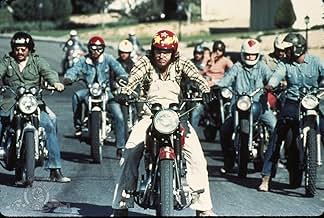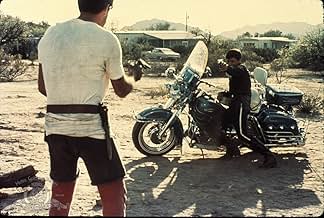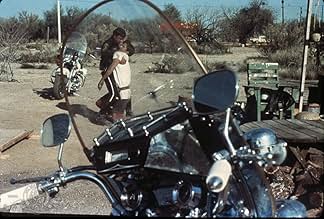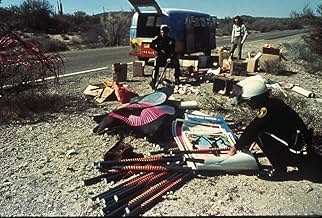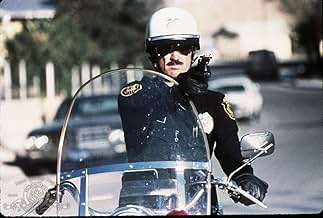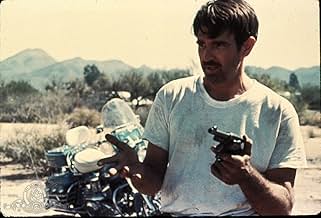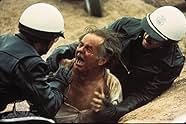IMDb-BEWERTUNG
7,0/10
6862
IHRE BEWERTUNG
Gelangweilt von seinen Aufgaben im Straßenverkehr wird der Motorradpolizist John Wintergreen aus Arizona dem Morddezernat zugeteilt, wo sein höflicher Ermittlungsstil seinen Macho-Chef verär... Alles lesenGelangweilt von seinen Aufgaben im Straßenverkehr wird der Motorradpolizist John Wintergreen aus Arizona dem Morddezernat zugeteilt, wo sein höflicher Ermittlungsstil seinen Macho-Chef verärgert.Gelangweilt von seinen Aufgaben im Straßenverkehr wird der Motorradpolizist John Wintergreen aus Arizona dem Morddezernat zugeteilt, wo sein höflicher Ermittlungsstil seinen Macho-Chef verärgert.
- Auszeichnungen
- 3 Nominierungen insgesamt
Billy Green Bush
- Zipper
- (as Billy 'Green' Bush)
Elisha Cook Jr.
- Willie
- (as Elisha Cook)
Hawk Wolinski
- VW Bus Driver
- (as David J. Wolinski)
Melissa Greene
- Zemko's Girlfriend
- (as Melissa Green)
Empfohlene Bewertungen
Pigs! Killers! Fascists! Anti-cop? Not a chance. The locals took one peek at the script and threw the entire film crew out of their precinct, and escorted them to the edge of town and beyond. Wow! Sharp bikes. And movie title. Robert Blake is dead on right as the highway cop. He makes up for in height by what he delivers in toughness and compassion. Miss Jeannie Riley plays the love interest of both Blake and his superior. She has a lengthy bar room scene bordering on religious fervor and regret. Nifty character turns by veterans Elisha Cook Jr. and Royal Dano. The action sequences are staged and edited with flair. The great cameraman, Conrad T. Hall, experimented with the interiors, flooding the camera lens with smoke, diffused light and warped, fun house-type angles. Memorable moments one and two: Blake has two great dress-up scenes. The first involves his uniform and motorcycle. The second concerns his new threads when he makes detective. An old do-wop group, The Marcels, invades the soundtrack with the flip side of "Blue Moon." However, the best musical cue occurs at the end of the film. The closing song, "Tell me," written by the producer/director/composer, James W. Guercio, of this film, is a masterpiece of the rock genre. Worthy of an Oscar or Grammy, the song begins with a nod to Blood, Sweat and Tears, travels to Chicago and, later, dismounts in Spectorville. A road and a movie well traveled. And taken
An incredible piece of film making, this beautifully shot movie really is about as poetic as it's possible for cinema to be and still have a coherent, gripping narrative. It feels like a western with its dramatic monument valley backdrop and masculine themes, but plays more like a European movie, with it's dark characterisations and existential mood . The soundtrack is fantastic and the feeling the movie imparts is unique. I always recommend this film to people because so few have ever seen it. I think it's a tragedy that James Guercio didn't make more movies because this was his first (and only) film and it's up there with the best of Peckinpah/Leone/Boorman/Seigal (whose work is similar). I'll never forget this film and the ending will live with me forever. If you like movies you need to see this film, This is real Cinema.
American music producer James William Guercio's one-off dalliance with filmmaking, ELECTRA GLIDE IN BLUE is made when he is only 28-year-old. It stars Robert Blake as a motorcycle cop Johnny Wintergreen who patrols rural Arizona highways and aspires to be a homicidal officer.
The movie opens with a promising panache hardly betrays that Guercio is a greenhorn, conjecturing through its voyeuristic close-ups, audience would soon realize a face-unshown man prepares to kill himself, yet, Guercio's camera also cunningly suggests that he is cooking beef streaks at the same time. Then, boom! He blows himself dead through a shotgun, which unusually aims to his chest rather than the usual easy target, the head, it compellingly sets a paradoxical situation that one immediately knows there is something fishy about the whole act.
Also, before the title card, Guercio takes a tongue-in-cheek tack to introduce our unlikely hero, big Johnny, the camera lurks and swirls in the apartment where Johnny expertly gratifies Jolene (Riley) in bed, before revealing that Johnny is small in stature. When a man's masculinity is stunted by his appearances, it gives audience an idea why he is so eager to achieve something, to compensate the ingrained inferiority complex is a shoo-in. So the apparent-suicidal case becomes his stepping stone to be recruited by detective Harve Poole (Ryan) for his astute observation that it is indeed a murder underneath the hatched facade.
But the ensuing police procedural dampens Johnny's driving enthusiasm, especially after witnessing Harve hectors physically abuses and a group of hippies to milk information about their prime suspect, a drug dealer Bob Zembo (a cameo of Peter Cetera, one of the four CHICAGO members who take on acting roles here apart from their contribution to the picture's soundtrack), and the final straw is an awkward confrontation between him, Harve and Jolene, the latter turns out to be Harve's lover, and spitefully lambastes Harve's incompetence to make her contented and laments her ill-fated destiny, working in a barrelhouse after a dashed Hollywood dream, Johnny and Harv fall out afterwards.
Unambiguously Guercio conducts a half-hearted approach to solve the murder mystery, after trifling with a biker-chasing set piece to keep the action moving, the movie falls back on Johnny's "inner voice" for an expedient epiphany to realize who is the murderer at the end of a MADURA concert, with reasons unexplained, but that is not enough, ultimately there would be another revelation later, to further muddle the water and leave the opening scene ever so ambivalent when one retraces back, before reaching its chilling coda, completely hits viewers like a cold shower, willful but symbolic, overall, it is a loner's world against the canvas of a vast Arizona landscape, everyone in the story is either indolent, disillusioned or corrupt, only the hippies' community stands in as a getaway from the unpleasant reality, but their guarded world is defiant towards the mainstream values, Johnny represents a tragic hero who is doomed because of what he represents, an authority figure, cannot be saved by his amiable personality and all-too-well intentions.
Performance-wise, everyone on board is on a par with excellence, Elisha Cook Jr. is heart-rending to watch in his committed lunacy, Mitchell Ryan expertly imbues a certain degree of passing diffidence in his bombast mannerism and Billy Green Bush is so organic as Johnny's shade- hogging partner and nails his big scene with a flourish, so is Jeannine Riley, manages to steal some limelight even with a role riddled with platitudes. And our leading man Robert Blake, ever so self- reliant as a pipsqueak trying rather hard to chase his dream, only to get short-changed by a cynical world.
ELECTRA GLIDE IN BLUE, also bolstered by a symphonic soundtrack produced by Guercio himself and its striking wide-screen landscape sensation shot by DP Conrad L. Hall, is an astonishing debut feature, if it intends to be more of a zeitgeist-capturer than a gripping detective story, then I must give my whole-hearted congratulations to the crew, mission grandly accomplished!
The movie opens with a promising panache hardly betrays that Guercio is a greenhorn, conjecturing through its voyeuristic close-ups, audience would soon realize a face-unshown man prepares to kill himself, yet, Guercio's camera also cunningly suggests that he is cooking beef streaks at the same time. Then, boom! He blows himself dead through a shotgun, which unusually aims to his chest rather than the usual easy target, the head, it compellingly sets a paradoxical situation that one immediately knows there is something fishy about the whole act.
Also, before the title card, Guercio takes a tongue-in-cheek tack to introduce our unlikely hero, big Johnny, the camera lurks and swirls in the apartment where Johnny expertly gratifies Jolene (Riley) in bed, before revealing that Johnny is small in stature. When a man's masculinity is stunted by his appearances, it gives audience an idea why he is so eager to achieve something, to compensate the ingrained inferiority complex is a shoo-in. So the apparent-suicidal case becomes his stepping stone to be recruited by detective Harve Poole (Ryan) for his astute observation that it is indeed a murder underneath the hatched facade.
But the ensuing police procedural dampens Johnny's driving enthusiasm, especially after witnessing Harve hectors physically abuses and a group of hippies to milk information about their prime suspect, a drug dealer Bob Zembo (a cameo of Peter Cetera, one of the four CHICAGO members who take on acting roles here apart from their contribution to the picture's soundtrack), and the final straw is an awkward confrontation between him, Harve and Jolene, the latter turns out to be Harve's lover, and spitefully lambastes Harve's incompetence to make her contented and laments her ill-fated destiny, working in a barrelhouse after a dashed Hollywood dream, Johnny and Harv fall out afterwards.
Unambiguously Guercio conducts a half-hearted approach to solve the murder mystery, after trifling with a biker-chasing set piece to keep the action moving, the movie falls back on Johnny's "inner voice" for an expedient epiphany to realize who is the murderer at the end of a MADURA concert, with reasons unexplained, but that is not enough, ultimately there would be another revelation later, to further muddle the water and leave the opening scene ever so ambivalent when one retraces back, before reaching its chilling coda, completely hits viewers like a cold shower, willful but symbolic, overall, it is a loner's world against the canvas of a vast Arizona landscape, everyone in the story is either indolent, disillusioned or corrupt, only the hippies' community stands in as a getaway from the unpleasant reality, but their guarded world is defiant towards the mainstream values, Johnny represents a tragic hero who is doomed because of what he represents, an authority figure, cannot be saved by his amiable personality and all-too-well intentions.
Performance-wise, everyone on board is on a par with excellence, Elisha Cook Jr. is heart-rending to watch in his committed lunacy, Mitchell Ryan expertly imbues a certain degree of passing diffidence in his bombast mannerism and Billy Green Bush is so organic as Johnny's shade- hogging partner and nails his big scene with a flourish, so is Jeannine Riley, manages to steal some limelight even with a role riddled with platitudes. And our leading man Robert Blake, ever so self- reliant as a pipsqueak trying rather hard to chase his dream, only to get short-changed by a cynical world.
ELECTRA GLIDE IN BLUE, also bolstered by a symphonic soundtrack produced by Guercio himself and its striking wide-screen landscape sensation shot by DP Conrad L. Hall, is an astonishing debut feature, if it intends to be more of a zeitgeist-capturer than a gripping detective story, then I must give my whole-hearted congratulations to the crew, mission grandly accomplished!
Robert Blake has one of the best roles of his career as John Wintergreen, a dedicated motorcycle cop who yearns for more in life. What he'd really like is to be a detective - to wear a suit, a Stetson, and "get paid to think". He gets his chance when he discovers what first appears to be a suicide, but which John determines had to have been a murder. When John shows that he's got what it takes for the detective business, a charismatic hotshot named Harve Poole (Mitch Ryan) takes him under his wing, hiring John as a driver. What happens is that John becomes quite disillusioned watching Harve at work. John strives to be a good, kind, honest man, and doesn't like Harves' approach to law enforcement. A revelation regarding his colleague and good friend "Zipper" (Billy Green Bush) only adds to his dismay.
"Electra Glide in Blue" marked the filmmaking debut for James William Guercio, a veteran of the music industry who, with the help of ace cinematographer Conrad Hall, brings a lot of visual poetry which is not the action-packed murder mystery that some viewers might expect, or hope, it to be. That aspect of this film is never heavily stressed, as the movie clearly functions much more as a series of character vignettes. It's got a very deliberate pace to it, as it gives a number of its major players opportunities to tear into some meaty roles. Blake and Bush have fine chemistry and are quite engaging; you believe them as buddies. Ryan commands the screen whenever he's around; he's an excellent character actor (whom you may know best as the villain in "Lethal Weapon") who gives his role some real nuance. Royal Dano is a little under utilized as a grumpy coroner with whom John butts heads, but Jeannine Riley is wonderful as the barmaid Jolene, and Elisha Cook Jr. is as delightful as ever in the role of sad old sack Willie. Considering Guercios' background, it's not a surprise that some of the supporting players come from the music business - screenwriter Hawk Wolinski as the van driving hippie, and Peter Cetera and Terry Kath from the band Chicago; Cetera, amusingly, plays a scruffy biker. Keep a sharp eye out for Nick Nolte, uncredited as an extra in the commune scene.
The film turns out to be a moving meditation on personal ideals and loneliness, and leads to a shattering conclusion. This conclusion is much in line with films of this time period, and takes its time to play out. It's the kind of thing you don't easily forget.
It's not hard to see why this would have a following. It's interesting and it's entertaining, and well worth a look.
Seven out of 10.
"Electra Glide in Blue" marked the filmmaking debut for James William Guercio, a veteran of the music industry who, with the help of ace cinematographer Conrad Hall, brings a lot of visual poetry which is not the action-packed murder mystery that some viewers might expect, or hope, it to be. That aspect of this film is never heavily stressed, as the movie clearly functions much more as a series of character vignettes. It's got a very deliberate pace to it, as it gives a number of its major players opportunities to tear into some meaty roles. Blake and Bush have fine chemistry and are quite engaging; you believe them as buddies. Ryan commands the screen whenever he's around; he's an excellent character actor (whom you may know best as the villain in "Lethal Weapon") who gives his role some real nuance. Royal Dano is a little under utilized as a grumpy coroner with whom John butts heads, but Jeannine Riley is wonderful as the barmaid Jolene, and Elisha Cook Jr. is as delightful as ever in the role of sad old sack Willie. Considering Guercios' background, it's not a surprise that some of the supporting players come from the music business - screenwriter Hawk Wolinski as the van driving hippie, and Peter Cetera and Terry Kath from the band Chicago; Cetera, amusingly, plays a scruffy biker. Keep a sharp eye out for Nick Nolte, uncredited as an extra in the commune scene.
The film turns out to be a moving meditation on personal ideals and loneliness, and leads to a shattering conclusion. This conclusion is much in line with films of this time period, and takes its time to play out. It's the kind of thing you don't easily forget.
It's not hard to see why this would have a following. It's interesting and it's entertaining, and well worth a look.
Seven out of 10.
EGinB should be seen as an anthem to early 70's America, and the ringing messages of all road movies at the time.The film is unique as a tour de force from a director who knew precisely what he was doing.From the opening scene, with it's brilliant use of close-ups, to the final incredible draw-back, EGinB relentlessly drives home the message of post-Vietnam America, with themes of honesty,realization,ruthlessness and duty.As in other Road Movies, the Road is the conduit along which America travels for hope and redemption.The implication is that it is only in the expanse and purity of the Big Country that these ideals can be attained.
Blake seizes his opportunity to wrest his character, Wintergreen, out of the Vietnam War and into a troubled American Society; not without a little resentment along the way. His remark to the truckdriver he books, displays his feelings; " I'll give you,what they gave me (in Vietnam)...nothing". His ideals of right and honesty give way eventually to acceptance of the system, with all it's failings.
The photography is beautiful and skillful, lending a curious winsome nostalgia to the Great American Outback.Wintergreen's gleaming bike,( the Electra Glide of the title), deserves a credit of it's own. EGinB has an ending that audiences have argued about for 30 years. I think it is an original devize by the director, that emphasises the plight of nations and individuals, who trade honesty and integrity for mundanity and compromise.Additionally, what you are really watching during the long 7 1/2 minutes drawback, is a pictorial unfolding of the American flag.This echos the ' God bless America ' lyrics of the Big Elk soundtrack.Watch it, and listen to the music of Big Elk as it unfolds.It somehow encapsulates the film and it's themes, and is mesmeric for that. See it, but realize what you are watching; it's worth the research; and you'll never see a Volkswagan Camper in the same light again!
Blake seizes his opportunity to wrest his character, Wintergreen, out of the Vietnam War and into a troubled American Society; not without a little resentment along the way. His remark to the truckdriver he books, displays his feelings; " I'll give you,what they gave me (in Vietnam)...nothing". His ideals of right and honesty give way eventually to acceptance of the system, with all it's failings.
The photography is beautiful and skillful, lending a curious winsome nostalgia to the Great American Outback.Wintergreen's gleaming bike,( the Electra Glide of the title), deserves a credit of it's own. EGinB has an ending that audiences have argued about for 30 years. I think it is an original devize by the director, that emphasises the plight of nations and individuals, who trade honesty and integrity for mundanity and compromise.Additionally, what you are really watching during the long 7 1/2 minutes drawback, is a pictorial unfolding of the American flag.This echos the ' God bless America ' lyrics of the Big Elk soundtrack.Watch it, and listen to the music of Big Elk as it unfolds.It somehow encapsulates the film and it's themes, and is mesmeric for that. See it, but realize what you are watching; it's worth the research; and you'll never see a Volkswagan Camper in the same light again!
Wusstest du schon
- WissenswertesFirst-time director James William Guercio wanted Conrad L. Hall to photograph this film, but Hall's salary was more than was budgeted for a cinematographer. Guercio reduced his own salary to $1.00 so he could secure Hall as the cinematographer.
- PatzerIn the final driving scenes, the van and the bike, supposedly driving along a long straight road, drive by the same distant butte at least three times.
- Zitate
Harve Poole: Incompetence is the worst form of corruption.
- Alternative VersionenJohn Wintergreen is called John Winterberg in the German version.
- VerbindungenEdited into The Our Gang Story (1994)
Top-Auswahl
Melde dich zum Bewerten an und greife auf die Watchlist für personalisierte Empfehlungen zu.
- How long is Electra Glide in Blue?Powered by Alexa
Details
Box Office
- Bruttoertrag in den USA und Kanada
- 1.600.000 $
- Laufzeit1 Stunde 54 Minuten
- Farbe
- Sound-Mix
- Seitenverhältnis
- 2.39 : 1
Zu dieser Seite beitragen
Bearbeitung vorschlagen oder fehlenden Inhalt hinzufügen

Oberste Lücke
By what name was Harley Davidson 344 (1973) officially released in India in English?
Antwort

